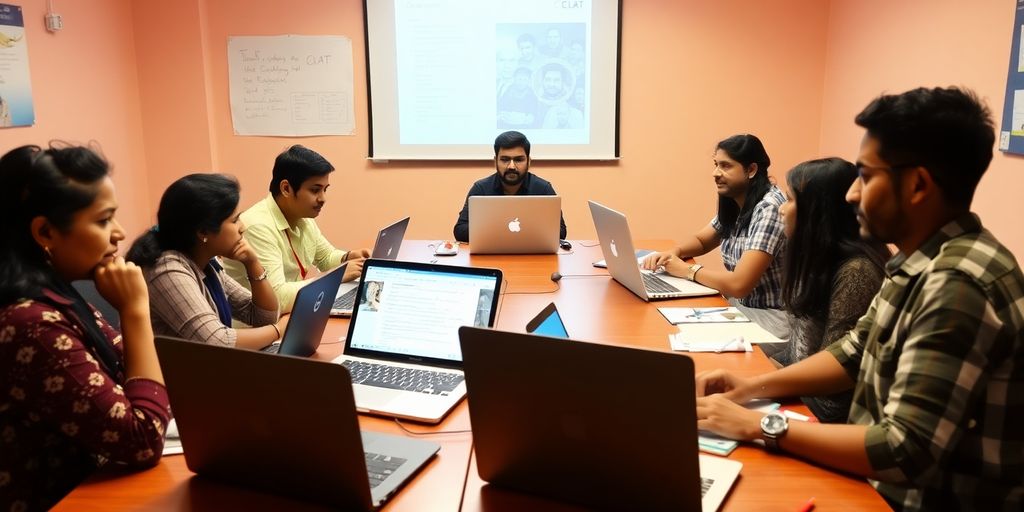Getting ready for CUET 2025? It’s a big deal for students eyeing university admissions. This test is key to getting into top colleges. But here’s the thing, the CUET 2025 pattern and syllabus have some changes you should know about. This guide will help you understand what’s new and how to tackle it. From the types of questions to the subjects covered, we’ve got you covered. Let’s break it down step by step so you’re fully prepared for success.
Key Takeaways
- CUET 2025 is crucial for university admissions in India.
- Understanding the exam pattern is vital for preparation.
- The syllabus covers a wide range of subjects and topics.
- Time management can make or break your performance.
- Mock tests are an essential part of your study routine.
- Stay updated on any changes to the exam format or syllabus.
- Balancing schoolwork and CUET prep is important.
- Stress management techniques can help maintain focus.
Introduction to CUET 2025: A Comprehensive Overview
Understanding the Importance of CUET 2025
The CUET 2025 exam is a gateway for students seeking admission to prestigious universities across India. It’s not just an exam; it’s a stepping stone to a brighter academic future. Understanding its significance can greatly influence your preparation strategy. With universities increasingly relying on CUET scores, performing well here can open doors to numerous educational opportunities.
Key Changes in CUET 2025
Every year, CUET undergoes updates to better assess student capabilities. For 2025, expect some changes that might affect how you prepare. The exam structure might be tweaked, or new subjects could be introduced. Keeping up with these changes ensures you don’t miss out on any critical updates. Stay informed by checking the official announcements regularly.
Eligibility Criteria for CUET 2025
Before diving into preparation, ensure you meet the eligibility criteria. Typically, students who have completed their 12th grade or equivalent are eligible. However, specific courses might have additional requirements. It’s crucial to verify these details early to avoid any last-minute surprises.
Registration Process for CUET 2025
Registering for CUET 2025 is a straightforward process, but it requires attention to detail. Start by visiting the official website and filling out the application form accurately. Double-check your details to avoid errors. Remember, registration is your first step towards taking the exam, so make sure it’s done right.
Exam Dates and Schedule for CUET 2025
Knowing the exam dates well in advance helps in planning your study schedule. CUET 2025 will likely be conducted over several days, accommodating various subjects and streams. Mark these dates on your calendar and plan your preparation accordingly. This way, you can allocate sufficient time for each subject.
CUET 2025: What to Expect
As the exam approaches, it’s natural to feel anxious about what lies ahead. CUET 2025 will test your knowledge across different subjects, with a mix of objective-type questions. The CUET (UG) exam will require you to manage your time effectively, as incorrect answers can lead to negative marking. Prepare thoroughly and practice with mock tests to gain confidence.
Decoding the CUET 2025 Exam Pattern
The CUET 2025 exam is structured to evaluate a wide range of skills and knowledge. It’s divided into multiple sections, each focusing on different subjects. Candidates can expect sections covering language, domain-specific knowledge, and general ability. This format ensures a comprehensive assessment of a student’s capabilities.
Types of Questions in CUET 2025
CUET 2025 will feature a mix of multiple-choice questions (MCQs), short answer types, and possibly scenario-based questions. These are designed to test not just rote memorization but also critical thinking and application skills.
Marking Scheme for CUET 2025
The marking scheme is straightforward: each correct answer earns you points, while incorrect ones might deduct some. Understanding the marking scheme is crucial to strategize your approach during the exam. Typically, there’s a penalty for wrong answers, so guessing isn’t always the best strategy.
Time Management Tips for CUET 2025
Managing your time effectively during the CUET is key. Allocate time to each section based on your strengths and weaknesses. Practice with timed mock tests to get a feel for the pace you need to maintain.
Common Mistakes to Avoid in CUET 2025
Avoid common pitfalls such as spending too much time on difficult questions, neglecting easier sections, and poor time management. It’s important to stay calm and focused throughout the exam.
Sample Questions for CUET 2025
Familiarize yourself with sample questions that reflect the exam’s format. Practicing these can give you a clear idea of what to expect and help reduce exam-day anxiety.
Preparing for CUET 2025? CUET Possible offers a range of resources and expert guidance to help you succeed. With their support, you can navigate the exam with confidence and aim for top scores.
CUET 2025 Syllabus: Subjects and Topics
Overview of CUET 2025 Syllabus
The CUET 2025 syllabus is your roadmap to success. It covers a wide range of subjects, ensuring that students are well-prepared for university-level education. Understanding the syllabus is crucial for effective preparation.
Subject-Wise Breakdown of CUET 2025
The syllabus is divided into several subjects, each with its own set of topics:
- Languages: English, Hindi, and regional languages.
- Science: Physics, Chemistry, Biology.
- Mathematics: Algebra, Geometry, Calculus.
- Social Sciences: History, Geography, Political Science.
- Commerce: Accountancy, Business Studies, Economics.
- General Test: Includes logical reasoning, quantitative reasoning, and general knowledge.
Important Topics for CUET 2025
Within each subject, certain topics are particularly important:
- Physics: Mechanics, Electromagnetism.
- Chemistry: Organic Chemistry, Chemical Kinetics.
- Biology: Genetics, Evolution.
- Mathematics: Trigonometry, Probability.
- History: Ancient Civilizations, World Wars.
- Economics: Microeconomics, Macroeconomics.
How to Prioritize Topics for CUET 2025
To manage your study time effectively, prioritize topics based on:
- Weightage: Focus on topics with higher marks.
- Difficulty Level: Start with easier topics to build confidence.
- Previous Year Trends: Look at past papers to identify frequently asked topics.
Resources for CUET 2025 Preparation
Preparing for CUET 2025 can be made easier with the right resources:
- Online courses offer flexibility and comprehensive coverage.
- Study guides and textbooks specific to CUET.
- Practice tests and mock exams to test your knowledge.
Updates in CUET 2025 Syllabus
Stay informed about any changes or updates in the syllabus. Regularly check official announcements to ensure you’re studying the right material.
"The CUET 2025 syllabus is designed to test a wide range of skills and knowledge, preparing students for the challenges of higher education."
Preparing for CUET 2025: Strategies and Tips
Effective Study Plans for CUET 2025
Crafting a study plan for CUET 2025 is like setting a roadmap for your exam journey. Consistency is key here. Start by assessing your strengths and weaknesses. Allocate more time to subjects that challenge you and less to those you’re comfortable with. Consider breaking your study sessions into manageable chunks. Short, focused periods can be more productive than marathon sessions.
Time Management Strategies for CUET 2025
Managing your time effectively can make or break your preparation. Begin by creating a daily schedule that balances study, rest, and leisure. Use timers to keep track of study sessions and breaks. Prioritize tasks and stick to your schedule as much as possible. Remember, it’s about quality, not quantity.
Utilizing Online Resources for CUET 2025
The internet is a goldmine for CUET prep. Explore online courses, video lectures, and forums where you can discuss topics with peers. Websites offering mock tests are particularly useful for gauging your readiness. Just be sure to verify the credibility of the resources you choose.
Role of Mock Tests in CUET 2025 Preparation
Mock tests are your best friends when it comes to exam prep. They help you understand the exam format and identify areas that need more focus. Take these tests regularly, and review your answers thoroughly. This practice can boost your confidence and performance on the actual test day.
Balancing School and CUET 2025 Preparation
Balancing schoolwork with CUET prep can be tricky. Try integrating your school studies with CUET topics to kill two birds with one stone. Communicate with your teachers about your exam schedule, so they can provide support or adjustments if needed.
Stress Management Techniques for CUET 2025
Stress is a natural part of exam prep, but managing it is crucial. Incorporate relaxation techniques like meditation or deep breathing into your routine. Ensure you’re getting enough sleep and eating well. Remember, taking care of your mental and physical health is as important as studying.
Understanding the CUET 2025 Registration Process
Step-by-Step Guide to CUET 2025 Registration
Getting started with CUET 2025 registration might seem daunting, but it’s really just a series of straightforward steps. First, visit the official CUET website and create an account. Once you’ve registered, fill out the application form with your personal details, educational background, and preferred course choices. Remember to double-check all information before submission. After completing the form, upload the necessary documents and proceed to the payment section. Finally, review everything and hit submit! You’ll receive a confirmation email once your application is successfully submitted.
Documents Required for CUET 2025 Registration
To ensure a smooth registration process, gather all required documents beforehand. These typically include:
- A scanned copy of your passport-sized photograph
- A scanned signature
- Educational certificates and mark sheets
- Caste or category certificate, if applicable
- Valid ID proof such as an Aadhaar card or passport
Having these documents ready will make the online registration process quicker and easier.
Common Registration Mistakes to Avoid
When registering for CUET 2025, avoid these common pitfalls:
- Entering incorrect personal details: Ensure all information matches your official documents.
- Uploading unclear or incorrect document scans: Double-check the clarity and format of your uploads.
- Missing deadlines: Keep track of the registration timeline to avoid last-minute rushes.
By steering clear of these mistakes, you can ensure a hassle-free registration experience.
Fee Structure for CUET 2025
The fee for CUET 2025 varies depending on the category of the applicant. Here’s a quick breakdown:
| Category | Fee (in INR) |
|---|
| General | 800 |
| OBC/EWS | 600 |
| SC/ST/PwD | 400 |
Payment can be made via net banking, credit/debit card, or UPI. Make sure to keep a copy of the payment receipt for future reference.
Important Dates for CUET 2025 Registration
Mark these dates on your calendar to ensure you don’t miss out:
- Registration opens: January 10, 2025
- Registration closes: March 15, 2025
- Correction window: March 20 – March 25, 2025
Keeping track of these dates will help you stay organized and complete your registration on time.
Helpline and Support for CUET 2025 Registration
If you encounter any issues during registration, assistance is available. The CUET helpline offers support via phone and email. Don’t hesitate to reach out if you have questions or need clarification. Sometimes, a quick call can save you a lot of stress. Additionally, CUET Possible provides resources and guidance to help you through each step of the process, ensuring you’re fully prepared for what’s ahead.
CUET 2025 Exam Day: What to Expect
Checklist for CUET 2025 Exam Day
Preparing for the CUET 2025 exam day involves more than just studying. To ensure a smooth experience, consider the following checklist:
- Admit Card: Make sure to print and carry your admit card. It’s your entry pass to the exam center.
- Identification Proof: Bring a valid ID proof like a school ID or government-issued ID.
- Stationery: Pack necessary items like pens, pencils, erasers, and a sharpener.
- Water Bottle: A clear water bottle is often allowed, but double-check the guidelines.
Navigating the CUET 2025 Exam Center
Arriving at the exam center can be overwhelming, especially with the crowd. Here’s how you can manage:
- Arrive early to find your designated room and seat.
- Follow the signs and instructions provided by the exam officials.
- If unsure, ask the staff for directions to avoid any last-minute confusion.
Time Allocation During CUET 2025
Time management is crucial during the CUET exam. Here’s a simple plan:
- Allocate time based on the weight of each section.
- Keep an eye on the clock to ensure you’re on track.
- Reserve the last few minutes for revising your answers.
Handling Exam Day Stress for CUET 2025
Stress can affect performance, so it’s important to stay calm:
- Practice deep breathing to help relax your mind.
- Visualize a successful exam day to boost confidence.
- Remember, a little stress is normal and can even be motivating.
Tip: Confidence comes from preparation. Trust your study efforts and remain focused.
Post-Exam Procedures for CUET 2025
Once the exam is over, there are a few things to keep in mind:
- Ensure all your belongings are collected before leaving the hall.
- Follow the exit instructions to maintain order and safety.
- Reflect on your performance and note areas for improvement.
Common Exam Day Issues and Solutions
Despite the best preparations, issues can arise. Here’s how to tackle them:
- Forgotten Items: Double-check your bag the night before.
- Nervousness: Practice relaxation techniques like deep breathing.
- Technical Glitches: Report immediately to the invigilator for assistance.
CUET 2025 is a significant step in your academic journey. With thorough preparation and a calm mindset, you can tackle the exam day challenges confidently. Remember, the Central Universities Entrance Test is not just a test of knowledge, but also of your ability to manage time and stress effectively.
Analyzing CUET 2025 Results and Scores

When you finally get your CUET 2025 scorecard, it’s like unlocking the results of all your hard work. It’s more than just numbers; it’s a key to your future studies. The scorecard typically includes your overall score, section-wise scores, and percentile rank. Interpreting these numbers correctly can guide your next steps.
How CUET 2025 Scores are Calculated
CUET scores are calculated based on the number of correct answers minus a fraction for incorrect ones. This means accuracy is just as important as speed. Make sure you’re aware of the negative marking scheme to avoid losing points unnecessarily.
Interpreting Your CUET 2025 Results
Interpreting your results can be a bit tricky. Focus on your percentile rank, as it shows how you performed compared to other candidates. A higher percentile means a better standing. Don’t just look at the overall score; analyze your section-wise performance to identify strengths and weaknesses.
Next Steps After Receiving CUET 2025 Results
Once you have your results, it’s time to plan. Here’s what you can do:
- Compare your scores with the cut-offs of your desired universities.
- Consider retaking the exam if your score doesn’t meet your expectations.
- Start preparing for interviews or other selection rounds if applicable.
Re-evaluation Process for CUET 2025
If you believe there’s been a mistake in your scores, CUET allows for a re-evaluation process. You’ll need to submit a formal request along with any required fees. Keep in mind that this doesn’t always lead to a change in your score.
CUET 2025 Score Validity and Usage
CUET scores are typically valid for one year. This means you can use them for admissions in the academic year immediately following the exam. Make sure to check the specific requirements of each university, as they might have different policies regarding score validity.
Remember, CUET Possible is here to support you through every step of your CUET journey, from preparation to understanding your scores. Don’t hesitate to reach out for guidance or resources.
CUET 2025: Insights from Past Toppers
Success Stories from CUET Toppers
Hearing from those who’ve aced the CUET can be a real game-changer. Many toppers credit their success to a blend of smart study habits and sheer dedication. For instance, some students shared how they balanced schoolwork with CUET prep by focusing on early morning study sessions. Others emphasized the importance of taking regular breaks to avoid burnout.
Study Techniques from CUET Toppers
Toppers often highlight the value of active learning methods like summarizing notes and teaching concepts to peers. Flashcards and mind maps are popular tools among top scorers for retaining complex information. They also suggest mixing up study materials, which aligns with Effective CUET exam preparation strategies.
Time Management Tips from CUET Toppers
Managing time effectively was a recurring theme among successful candidates. They recommend setting clear goals and sticking to a daily schedule. Breaking study sessions into manageable chunks and using timers to stay on track can help maintain focus. These insights can be crucial for anyone aiming to excel in CUET.
Handling Pressure: Advice from CUET Toppers
Pressure is inevitable, but how you handle it makes all the difference. Toppers advise practicing mindfulness or meditation to stay calm. They also stress the importance of maintaining a healthy lifestyle, including regular exercise and proper sleep, to keep stress levels in check.
Common Challenges Faced by CUET Toppers
Even the best students face hurdles. Many toppers struggled with balancing their social life and studies. Some found certain subjects more challenging, requiring extra effort and creative solutions to overcome these difficulties. Learning from these experiences can prepare future candidates for similar challenges.
Motivational Tips from CUET Toppers
Staying motivated is key, and past toppers have shared various tactics. They suggest setting small, achievable goals and celebrating each milestone. Keeping a positive mindset and surrounding oneself with supportive peers and mentors can make the journey less daunting. Remember, every small step counts towards success.
CUET 2025: Frequently Asked Questions

General FAQs About CUET 2025
So, CUET 2025 is just around the corner, and you might have a ton of questions buzzing in your head. Let’s tackle some of the most common ones right here. First off, what exactly is CUET? It’s the Common University Entrance Test, a must for students aiming to get into central universities in India. You might be wondering about the eligibility criteria. Well, if you’re in your final year of high school or have just completed it, you’re good to go. Another frequent query is about the exam format. It’s a computer-based test comprising multiple-choice questions across various subjects. Don’t stress too much about it, though—preparation is key.
Subject-Specific FAQs for CUET 2025
When it comes to specific subjects, folks often ask about the syllabus. The CUET syllabus is pretty comprehensive, covering subjects like Physics, Chemistry, Math, and more. Each section has its own weight, so you might want to focus on your strengths but don’t neglect the others. Another popular question is about the difficulty level. It’s generally moderate, but it can vary slightly depending on the subject. If you’re still unsure, joining a reputable coaching institute can really help you get a better grip on the material.
Registration FAQs for CUET 2025
Now, let’s talk registration. The process is pretty straightforward. You start by filling out an online application form, which you can find on the official CUET website. Make sure you have all the necessary documents ready, like your ID proof and recent passport-sized photos. People often ask about the registration fee. It’s usually around a couple of thousand rupees, but it’s best to check the latest updates on the official site. Also, don’t leave it to the last minute—early birds avoid the rush.
Exam Day FAQs for CUET 2025
Exam day jitters are real, but knowing what to expect can ease the tension. First up, what should you bring? Your admit card is a must, along with an ID proof. As for the dress code, keep it simple and comfortable. Another common concern is about the exam center. Arrive early to settle in and familiarize yourself with the surroundings. And hey, don’t forget to carry a bottle of water to stay hydrated.
Result and Score FAQs for CUET 2025
Once the exam’s done, the next big thing is the results. A lot of students ask about the score calculation. CUET scores are based on the number of correct answers, with a little penalty for wrong ones. The results are usually out a few weeks post-exam, and you can check them online using your roll number. If you’re not satisfied with your score, there’s often an option for re-evaluation. Just keep an eye on the announcements for details.
Preparation FAQs for CUET 2025
Finally, when it comes to preparation, everyone wants to know the secret sauce. There’s no one-size-fits-all answer, but a good start is to understand the CUET syllabus thoroughly and create a structured study plan. Regular mock tests are a game-changer—they help you get used to the exam format and improve time management. And remember, consistency is your best friend. Stay motivated, and you’ll do great!
CUET 2025: Resources and Study Materials
Recommended Books for CUET 2025
When it comes to preparing for CUET 2025, having the right books is like having the right tools in your toolbox. A few must-have books include the latest editions of NCERT textbooks, as they cover the fundamentals needed for the exam. Subject-specific guides, such as those for Physics, Chemistry, and Mathematics, are also crucial. Additionally, books that offer practice questions and previous years’ papers can be incredibly helpful.
Online Courses for CUET 2025 Preparation
In today’s digital age, online courses provide a flexible and comprehensive way to prepare for CUET 2025. Platforms like CUET Possible offer structured courses that cover all the necessary topics, complete with video lectures and interactive quizzes. These courses can be accessed anytime, allowing students to learn at their own pace.
CUET 2025 Study Groups and Forums
Joining study groups and forums can be a game-changer for CUET 2025 aspirants. These groups provide a space to discuss difficult topics, share resources, and get tips from peers who are also preparing for the exam. Engaging with these communities can help clarify doubts and keep you motivated.
Free Resources for CUET 2025
Not all resources need to break the bank. There are plenty of free resources available online for CUET 2025 preparation. Websites offering free mock tests, sample papers, and video tutorials can be invaluable. Make sure to take advantage of these free tools to enhance your study routine.
CUET 2025 Coaching Centers
For those who prefer a more traditional approach, enrolling in a coaching center might be the way to go. Coaching centers provide structured learning environments with experienced instructors who can guide you through the CUET 2025 syllabus. They often offer personalized feedback and strategies to tackle the exam effectively.
How to Choose the Right Study Material for CUET 2025
Choosing the right study material is crucial for effective preparation. Consider materials that align with the CUET 2025 syllabus and offer a variety of question types. It’s beneficial to use a mix of textbooks, online resources, and practice papers. Remember, quality trumps quantity, so focus on understanding concepts rather than hoarding resources.
Preparing for CUET 2025 is not just about hard work; it’s about smart work. Utilize a range of resources to cover all bases, and remember to keep your study plan flexible to accommodate different learning styles.
CUET 2025: Understanding the Marking Scheme
Detailed Marking Scheme for CUET 2025
Understanding the marking scheme for CUET 2025 is crucial to maximizing your score. The exam follows a straightforward pattern where each correct answer earns you one mark. However, beware of negative marking; for every incorrect response, 0.25 marks are deducted from your total. This means accuracy is key, and guessing might not always work in your favor.
Negative Marking in CUET 2025
Negative marking is designed to discourage random guessing. It’s important to weigh your options before answering. If you’re unsure about a question, it might be better to skip it rather than risk losing marks. This approach can help maintain a positive score and improve your chances of success.
Scoring High in CUET 2025
To score high, focus on accuracy and time management. Practice past papers and choose the right coaching institute to guide you through the preparation. A good coaching center will help you understand the nuances of the exam and provide strategies to tackle difficult questions.
Common Misconceptions About CUET 2025 Marking
Many students believe that answering more questions leads to a higher score. However, with negative marking, this isn’t always true. Quality over quantity should be your mantra. Ensure you thoroughly understand each question before answering.
Impact of Marking Scheme on CUET 2025 Preparation
The marking scheme influences how you prepare. Focus on strengthening your weak areas to reduce the chances of incorrect answers. Regular practice and mock tests can help you get familiar with the exam format and improve your accuracy.
Examples of Marking in CUET 2025
Let’s break it down with an example. Suppose you answer 80 questions correctly and 20 incorrectly:
- Correct Answers: 80 x 1 = 80 marks
- Incorrect Answers: 20 x -0.25 = -5 marks
- Total Score: 80 – 5 = 75 marks
This example shows how incorrect answers can impact your total score. Aim for accuracy to achieve the best possible outcome.
CUET 2025: Importance of Mock Tests
Benefits of Taking CUET 2025 Mock Tests
Mock tests are like a sneak peek into the real thing. They help you get used to the exam format, which is super handy. You’ll know exactly what to expect, and that can really calm the nerves on the big day. Plus, they help you figure out your strong and weak spots. Identifying these areas early on can guide your study sessions more effectively.
How to Analyze CUET 2025 Mock Test Results
After taking a mock test, don’t just shove it in a drawer. Take a good look at your results. Check out where you did well and where you stumbled. This analysis is key. It’s like a roadmap showing you where to focus your efforts. Maybe you’re acing math but struggling with language skills? That’s your cue to adjust your study plan.
Frequency of Mock Tests for CUET 2025
How often should you take these tests? Well, regularly is the answer. But don’t overdo it. Once a week is a good start. It keeps the material fresh in your mind without overwhelming you. Think of it as a regular check-up on your progress.
Creating a Mock Test Schedule for CUET 2025
Planning is everything. Set up a schedule for your mock tests. Maybe start with one every two weeks and then ramp up to weekly as the exam gets closer. This way, you gradually build up your stamina and confidence.
Improving Performance with CUET 2025 Mock Tests
Mock tests are not just about testing knowledge. They’re about strategy. Time management is a biggie. Practice finishing the test within the allotted time. Also, try different strategies to see what works best for you—like tackling the easiest questions first to secure those points.
Common Mistakes in CUET 2025 Mock Tests
Everyone makes mistakes, but some are avoidable. Don’t rush through the test. Take your time to read each question carefully. And don’t ignore the review part; it’s just as important as taking the test itself. Reviewing helps cement what you’ve learned and highlights areas needing more work.
Mock tests are a crucial part of CUET preparation. They not only build confidence but also help in refining your approach to the actual exam. Remember, the goal is to learn and improve with each test, not just to score high.
CUET 2025: Time Management Techniques
Effective Time Management for CUET 2025
Managing your time well can be a game-changer for CUET 2025 prep. Breaking down your study sessions into manageable chunks can help you grasp concepts better without feeling overwhelmed. Try the Pomodoro Technique: study for 25 minutes, then take a 5-minute break. This method keeps your mind fresh and focused.
Balancing Study and Leisure for CUET 2025
It’s not all about hitting the books. Make sure to balance study with leisure. Whether it’s a walk, a hobby, or just chilling with friends, taking time off helps recharge your brain. Remember, a relaxed mind is more receptive to learning.
Creating a Study Schedule for CUET 2025
A well-thought-out study schedule is your best friend. Jot down all the subjects and topics you need to cover, then allocate specific times for each. Stick to this schedule as much as possible, but be flexible. Life happens, and sometimes you’ll need to adjust.
Avoiding Procrastination During CUET 2025 Preparation
Procrastination is your enemy. Set clear, achievable goals for each study session. Write them down, and check them off as you go. This small act of ticking off tasks can boost your motivation and keep procrastination at bay.
Using Technology for Time Management in CUET 2025
Tech can be a huge help in managing your time. Use apps like Todoist or Trello to keep track of tasks and deadlines. These tools can send reminders and help you prioritize what’s most important.
Time Management Mistakes to Avoid in CUET 2025
Don’t fall into the trap of over-scheduling. While planning is key, cramming too much into your day can lead to burnout. Also, avoid multitasking. Focus on one task at a time to ensure quality learning. Lastly, don’t forget to review your progress regularly to make sure you’re on track.
"The secret to getting ahead is getting started." Embrace this mindset as you prepare for CUET 2025, and let effective time management guide your journey to success.
CUET 2025: Stress Management for Students
Identifying Stress Triggers for CUET 2025
Preparing for CUET can be a real rollercoaster, right? It’s important to pinpoint what exactly sets off your stress. It could be the sheer volume of the syllabus or maybe the pressure of balancing schoolwork and prep. Recognizing these triggers is the first step to managing them effectively. Once you know what gets you worked up, you can start to tackle it head-on.
Techniques to Reduce Stress for CUET 2025
So, you’ve figured out what stresses you out. Now, what can you do about it? Here are some techniques:
- Meditation and Mindfulness: Taking a few minutes each day to clear your mind can do wonders.
- Regular Exercise: Even a short walk or a quick workout can help release tension.
- Scheduled Breaks: Don’t just grind away for hours. Break your study sessions into chunks with short breaks in between.
Balancing Stress and Performance in CUET 2025
Finding the right balance between stress and performance is like walking a tightrope. A little stress can actually be motivating, but too much can be paralyzing. It’s all about finding that sweet spot where you’re alert but not overwhelmed.
Role of Relaxation in CUET 2025 Preparation
Never underestimate the power of relaxation. Whether it’s listening to music, reading a book, or just chilling with friends, relaxation is crucial. It helps reset your mind and keeps burnout at bay. Think of it as a necessary part of your study routine, not just a luxury.
Seeking Support for CUET 2025 Stress
If the stress gets too much, don’t hesitate to reach out. Talk to friends, family, or even teachers. Sometimes just sharing your worries can lighten the load. Plus, they might have some great advice or resources to help you out.
Long-Term Stress Management for CUET 2025
Stress management isn’t just about quick fixes. It’s about building habits that keep stress at a manageable level over time. Regular exercise, healthy eating, and a good sleep routine are key. Remember, it’s a marathon, not a sprint, and maintaining your mental health is just as important as acing the exam.
Preparing for exams like CUET can be tough, but with the right strategies, you can keep stress in check and perform at your best. Remember, it’s not just about studying hard, but also about taking care of yourself.
For those juggling CLAT and CUET preparation, managing stress is even more crucial. Effective strategies are essential to keep both exams on track.
CUET 2025: Role of Technology in Preparation
Using Apps for CUET 2025 Preparation
In today’s digital age, apps are revolutionizing how students prepare for exams like CUET 2025. With just a smartphone, students can access a variety of educational apps that offer practice tests, flashcards, and even interactive lessons. These tools can make learning more engaging and accessible, allowing students to study anytime, anywhere. Apps also provide personalized feedback, helping students identify their strengths and weaknesses.
Online Study Platforms for CUET 2025
Online platforms have become an essential part of exam preparation. They offer a wide range of resources, from video lectures to practice questions. Platforms like CUET Possible provide structured courses that cover the entire syllabus, ensuring students don’t miss out on any important topics. These platforms often have forums where students can discuss doubts and share tips, creating a community-driven learning environment.
Virtual Study Groups for CUET 2025
Virtual study groups are another way technology is enhancing exam preparation. Through video calls and online forums, students can collaborate with peers from different locations. This not only broadens their understanding but also exposes them to diverse perspectives and problem-solving techniques. Virtual study groups can be particularly beneficial for students who thrive in collaborative environments.
Digital Resources for CUET 2025
The internet is a treasure trove of digital resources for CUET 2025 preparation. From e-books to online quizzes, students can find a plethora of materials to aid their studies. Websites dedicated to CUET offer CUET online coaching which can be a great supplement to traditional study methods. These resources are often updated with the latest information, ensuring students have access to current content.
Technology-Driven Study Techniques for CUET 2025
Adopting technology-driven study techniques can significantly enhance a student’s preparation strategy. Techniques such as spaced repetition, digital note-taking, and online flashcards can help in retaining information more effectively. Students can also use analytics from study apps to track their progress and adjust their study plans accordingly.
Challenges of Using Technology for CUET 2025
While technology offers numerous benefits, it also comes with its challenges. Distractions from social media and other non-educational apps can hinder study time. Moreover, not all students have equal access to technology, which can create a digital divide. It’s important for students to set boundaries and use technology mindfully to avoid these pitfalls.
CUET 2025: Balancing School and Exam Preparation
Creating a Balanced Study Plan for CUET 2025
Finding the right balance between schoolwork and CUET 2025 prep can feel like juggling flaming torches. It’s all about planning smartly. Start by creating a weekly schedule that includes dedicated time slots for both school assignments and CUET study. Prioritize tasks based on deadlines and difficulty level. Make sure to:
- Allocate specific hours for CUET subjects each week.
- Set realistic goals for what you want to achieve in each session.
- Include breaks to avoid burnout.
Managing School Assignments with CUET 2025
School assignments can pile up fast, especially when you’re also preparing for CUET. To keep things under control, try:
- Breaking down assignments into smaller tasks.
- Using a planner to track due dates and progress.
- Tackling the hardest subjects when your energy levels are highest.
Prioritizing Tasks for CUET 2025
With so much on your plate, figuring out what to tackle first is key. Focus on:
- Core subjects that are heavily weighted in CUET.
- Topics you find challenging and need more practice with.
- Regularly revisiting past papers to get familiar with the exam format.
Effective Communication with Teachers About CUET 2025
Teachers can be great allies in your CUET journey. Keep them in the loop about your exam prep:
- Discuss your CUET schedule and ask for advice on managing schoolwork.
- Seek feedback on your progress and areas of improvement.
- Don’t hesitate to ask for extra help on tough topics.
Utilizing School Resources for CUET 2025
Your school might have more resources than you realize. Check out:
- Study groups or clubs focused on CUET subjects.
- Libraries for additional materials or past exam papers.
- Teachers who can offer extra classes or guidance sessions.
Maintaining Social Life During CUET 2025 Preparation
Balancing study and social life can be tricky, but it’s doable. Remember:
- Schedule time with friends as a reward for completing study goals.
- Keep social activities low-key and relaxing.
- Use social time to recharge, not as an escape from study.
CUET 2025: Insights from Educators
Advice from Teachers on CUET 2025
Teachers are like the unsung heroes of CUET prep. They see firsthand what students struggle with and what works. One key piece of advice they give is to really know the syllabus inside out. It’s not just about covering topics; it’s about understanding them deeply. They also suggest students take advantage of mock tests to simulate real exam conditions.
Common Mistakes Noted by Educators in CUET 2025
Educators often spot a few common pitfalls. First, students tend to ignore time management, leading to rushed answers. Next, there’s the issue of rote learning. Many students memorize without grasping concepts, which backfires during the exam. Lastly, skipping revisions can be a big mistake. Regular review sessions help reinforce knowledge and boost confidence.
Effective Teaching Methods for CUET 2025
Innovative teaching methods are making waves in CUET prep. Teachers are using digital platforms and interactive tools to engage students better. Group studies and peer teaching are encouraged, allowing students to learn from each other. Some educators even incorporate gamified learning to make studying less of a chore.
Role of Educators in CUET 2025 Preparation
Educators play a crucial role in guiding students through the CUET maze. They provide personalized feedback, helping students identify their strengths and weaknesses. Many teachers also offer extra classes or doubt-clearing sessions, ensuring students are well-prepared.
Feedback from Educators on CUET 2025
Feedback from educators highlights the importance of a balanced study schedule. They stress that students should balance study time with breaks to avoid burnout. Teachers also emphasize the need for a positive mindset, reminding students that confidence can significantly impact performance.
Educators’ Predictions for CUET 2025
Looking ahead, educators predict a greater emphasis on analytical skills and problem-solving in CUET 2025. They foresee the exam evolving to test not just knowledge, but the ability to apply it in real-world scenarios. This shift means students will need to focus more on understanding concepts rather than just memorizing facts.
CUET 2025: Importance of a Study Routine

Building a Consistent Study Routine for CUET 2025
Creating a consistent study routine is like setting the foundation for a house. If it’s strong, everything else falls into place. Start by picking a time each day when you’re most alert and stick to it. This helps your brain expect study time and get into the right mode. It’s not just about hitting the books but also about making it a habit.
Adapting Study Routines for CUET 2025
Life happens, right? Sometimes your routine needs a tweak. Maybe you got a new project at school or your favorite show changed its airing time. The key is flexibility. Adjust your routine without losing the core focus on CUET prep. It’s okay to shuffle things around as long as you’re still on track.
Benefits of a Structured Study Routine for CUET 2025
A structured routine helps reduce stress. Knowing what comes next can be a huge relief. Plus, it makes tracking progress easier. You’ll know if you’re ahead or need to catch up. A routine also helps balance study and leisure, so you don’t burn out.
Incorporating Breaks in CUET 2025 Study Routine
Breaks are your friend! They prevent burnout and keep you fresh. Try the Pomodoro Technique—study for 25 minutes and take a 5-minute break. It sounds simple, but it can do wonders for your focus and energy levels.
Adjusting Study Routines Based on CUET 2025 Progress
As you move forward, keep an eye on what’s working and what’s not. Maybe math is taking longer than expected, or you’re breezing through English. Adjust your routine to focus more on areas that need attention. This way, you’re always moving forward efficiently.
Common Pitfalls in CUET 2025 Study Routines
Watch out for these traps: procrastination, over-scheduling, and ignoring breaks. It’s easy to fall into the "I’ll do it later" trap, but that just piles up stress. Over-scheduling can lead to burnout, while skipping breaks can make you less productive. Keep it balanced and realistic.
Remember, a good study routine is all about balance and consistency. It’s not about cramming but about steady, focused preparation. With a solid routine, tackling CUET preparation alongside schoolwork becomes manageable.
CUET 2025: Understanding the Role of Parents
Supporting Your Child During CUET 2025
Parents play a crucial role in their child’s preparation for CUET 2025. Being supportive means more than just providing study materials or a quiet space. It’s about emotional backing and understanding the pressures your child faces. Encourage open communication and make sure they know you’re there for them.
Communicating with Your Child About CUET 2025
Talk to your child regularly about their progress and any concerns they might have. Open conversations can help reduce stress and build trust. Ask them about their study plans, challenges, and how they’re feeling about the upcoming exam.
Providing Resources for CUET 2025 Preparation
Ensure your child has access to quality resources. This might include books, online courses, or even choosing a coaching institute that can guide them through the CUET preparation. Discuss the options and help them decide what works best for their learning style.
Balancing Encouragement and Pressure for CUET 2025
Finding the right balance between encouraging your child and applying pressure is key. Too much pressure can lead to stress and burnout, while too little might not motivate them enough. Be their cheerleader, but also give them space to manage their own study routine.
Recognizing Signs of Stress in CUET 2025 Preparation
Stay alert to changes in your child’s behavior that might indicate stress. These can include mood swings, changes in sleep patterns, or withdrawal from social activities. If you notice any of these signs, talk to them and, if necessary, seek professional help.
Creating a Supportive Environment for CUET 2025
A supportive environment at home can make a big difference. This means not just a quiet place to study, but also a positive atmosphere that encourages learning and growth. Celebrate small achievements and remind them that their efforts are valued, regardless of the outcome.
CUET 2025: Exploring Career Opportunities
Career Paths After CUET 2025
Taking the CUET 2025 opens a wide array of career paths. From engineering and technology to arts and humanities, students have the flexibility to choose a field that aligns with their passion and strengths. Engineering, medicine, and law are among the popular choices, but students can also explore careers in creative fields like design or media.
How CUET 2025 Influences Career Choices
The CUET 2025 isn’t just about getting into a university; it’s about shaping your future. The scores you achieve can determine the quality of institutions you can attend, which in turn influences your career trajectory. High scores might open doors to prestigious universities, offering better programs and exposure, thus impacting your career choices significantly.
Role of CUET 2025 in Higher Education
CUET 2025 plays a significant role in higher education as it standardizes the admission process across multiple universities. This means students are judged on a common scale, ensuring fairness and transparency. The test encourages students to focus on their academic strengths, which is crucial for their educational journey.
Exploring University Options with CUET 2025
With CUET 2025, students have the opportunity to explore a variety of universities across the country. Each university has its own set of strengths and specializations, so students can select institutions that match their career aspirations. Whether it’s a focus on technical skills or liberal arts, CUET 2025 helps students find their right fit.
Long-Term Career Planning with CUET 2025
Planning your career doesn’t stop at choosing a university. CUET 2025 helps students think long-term by encouraging them to consider how their chosen field of study will affect their future job prospects. This strategic planning is essential for ensuring that students are not only prepared for their exams but also for their future careers.
The CUET 2025 is more than just an entrance test; it’s a stepping stone to your future. It guides you through the maze of career choices, helping you find a path that suits your ambitions and skills.
Industry Insights on CUET 2025
Industry experts agree that CUET 2025 prepares students well for the challenges of higher education and beyond. The test’s focus on core subjects ensures that students have a solid foundation, which is crucial for any career path. Moreover, it fosters skills like critical thinking and problem-solving, which are highly valued in any industry.
For effective preparation, consider structured coaching and expert guidance to boost your chances of success.
CUET 2025: The Future of University Admissions
Trends in University Admissions Post-CUET 2025
The landscape of university admissions is always shifting, and CUET 2025 is set to play a major role in this evolution. With more institutions relying on standardized testing, CUET’s importance is growing. Universities are increasingly using CUET scores as a key metric for admissions, making it crucial for students aiming for top-tier programs. This shift reflects a broader trend towards standardized assessments, which aim to level the playing field for students from diverse backgrounds.
Impact of CUET 2025 on University Selection
With CUET 2025 becoming a central part of the admissions process, students and universities alike are adapting. For students, this means a clearer understanding of what universities expect, allowing for more strategic preparation. For universities, CUET provides a consistent measure to evaluate applicants, which can simplify the selection process. This might lead to a more streamlined admissions cycle, benefiting both parties.
How CUET 2025 Shapes Academic Futures
CUET 2025 is more than an entrance exam; it’s a gateway to future academic opportunities. By focusing on a standardized test, students can demonstrate their readiness for higher education across a range of disciplines. This can open doors to programs that align with their strengths and career goals, ultimately shaping their academic trajectory.
University Feedback on CUET 2025
Universities are generally positive about the integration of CUET 2025 into their admissions processes. They appreciate the uniformity it brings, which helps in comparing applicants from different educational backgrounds. However, some institutions are still adjusting to this model, and feedback is ongoing. Continuous dialogue between universities and CUET administrators is essential to refine the process.
Adapting to Changes in University Admissions
As CUET 2025 becomes more entrenched in the admissions landscape, students must adapt their preparation strategies. This might include focusing more on test-taking skills or seeking resources like CUET Possible to enhance their readiness. The shift also requires universities to adjust their admissions criteria and processes to align with CUET’s framework.
The CUET 2025 is not just an exam; it’s shaping the future of university admissions. As it becomes a staple in the admissions toolkit, students and universities must navigate this new terrain with agility and foresight.
Future Predictions for CUET 2025
Looking ahead, CUET 2025 is likely to influence admissions policies even further. As more institutions adopt CUET scores as a primary admissions criterion, the test’s design and content might evolve to better assess a wider range of skills and knowledge areas. This evolution will continue to impact how students prepare and how universities select their incoming classes.
CUET 2025 is set to change how students get into universities. This new system will make it easier for students to apply and get accepted into their dream schools. If you want to learn more about CUET and how to prepare for it, visit our website for helpful resources and courses!
Conclusion
So, there you have it. Getting ready for CUET 2025 might seem like a big task, but with the right info and a solid plan, you’re on the right track. Remember, it’s not just about cramming; understanding the pattern and syllabus is key. Take it step by step, and don’t forget to give yourself some breaks. You’ve got this, and with a bit of effort, success is within reach. Good luck!
CUET 2025: Frequently Asked Questions
What is CUET 2025?
CUET 2025 is a test you take to get into universities in India. It helps schools decide who to let in based on scores.
Who can take CUET 2025?
Anyone who has finished high school or is about to finish can take CUET 2025. You must meet the rules set by the schools you want to apply to.
When do I register for CUET 2025?
You can sign up for CUET 2025 online. The dates for signing up are usually announced early in the year.
How is CUET 2025 structured?
CUET 2025 has different sections with questions on subjects like math, science, and language. Each part tests what you know in these areas.
What is the marking scheme for CUET 2025?
For CUET 2025, you earn points for right answers, but you might lose points for wrong ones. It’s important to know how each question is scored.
How can I prepare for CUET 2025?
You can prepare for CUET 2025 by studying your school books, taking practice tests, and using online resources to help you learn.
What should I bring on the exam day?
On the day of the CUET 2025 exam, bring your admit card, an ID, and any needed stationery like pens and pencils.
How do I manage my time during the exam?
To manage your time well during CUET 2025, practice with timed tests and plan how long to spend on each question.
What happens after I take CUET 2025?
After the test, you will get your scores. You can use these scores to apply to different universities.
Can I retake CUET 2025 if I don’t do well?
Yes, if you don’t do well, you can try again next year. Check the rules for retaking the test.
Where can I find practice tests for CUET 2025?
You can find practice tests online or in books that help you get ready for CUET 2025.
How do I stay calm during CUET 2025?
To stay calm, practice deep breathing, take breaks while studying, and make sure to rest well before the exam.


































